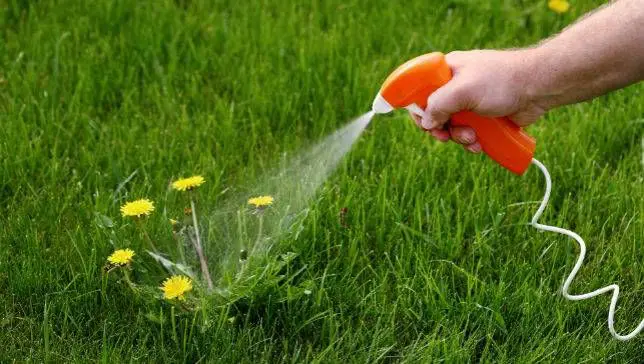The use of herbicides, commonly known as weed killers, is widespread in the agricultural and landscaping industries to control unwanted plant growth.
However, these chemical substances may have considerable detrimental effects on our environment.
This article will discuss the potential environmental risks associated with using such chemicals – their composition; consequences for wildlife, soil, and water; and alternative methods other than traditional herbicide applications.
Chemical Composition of Weed Killers
Herbicides usually contain chemicals such as glyphosate, 2,4-D, and dicamba.
These substances are developed to block plant growth by targeting specific hormones or enzymes inside the plants.
Unfortunately, these same chemicals that can be harmful to weeds may also cause negative impacts on other organisms in the environment. Here are a few explanations about each chemical found in herbicides :
1. Glyphosate
Glyphosate, a widely used herbicide, has been linked to toxic effects on aquatic organisms such as amphibians and fish.
Moreover, this chemical is thought to be responsible for decreasing monarch butterfly populations since we found that glyphosate reduces milkweed abundance, which serves as an essential food source for these butterflies.
2. 2,4-D
Studies have shown that 2,4-D, a commonly used herbicide, can be detrimental to wildlife health as it has been linked to reproductive and developmental problems in birds, fish, and mammals.
This chemical is toxic to aquatic plants, which may lead to the degradation of marine ecosystems.
3. Dicamba
Dicamba is a widely used herbicide, but it can be toxic to certain plants and animals not intended for treatment. Soybeans, cotton, and fruit trees – are all vulnerable to their damaging effects.
Studies have suggested that dicamba may lead to diminished populations of beneficial insects such as bees and butterflies.
Examining the Long-Term Effects of Weed Killers on the Environment
Many people are concerned about the potential long-term effects of weed killers on the environment. Weed killer, a pesticide used to eliminate unwanted plants, is effective in removing weeds; however, it can also seriously impact ecosystems. These include:
1. Impact on Wildlife
Using weed killers can have devastating effects on wildlife and their habitats. Pollinator populations, such as bees and butterflies, are particularly vulnerable to herbicides since the chemicals can destroy or reduce the availability of their food sources.
Additionally, aquatic life is at risk from these substances because they contaminate water sources while decreasing plant growth which many marine species rely upon for sustenance.
Herbicides can be detrimental to terrestrial wildlife by decreasing cover availability and food availability.
Glyphosate, for example, has been connected to decreases in upland game bird populations like quail and pheasants since it diminishes native grasses and other covers.
Moreover, herbicides may cause harm to amphibians and reptiles due to their direct toxicity and reduction in accessible shelter or nourishment sources.
2. Impact on Soil and Water
Herbicide use can have detrimental effects on soil and water.
Soil erosion is accelerated when plants, which generally act as anchors for the earth, are killed off or stunted by herbicides.
Likewise, runoff and leaching of these chemicals into bodies of water cause polluted conditions that threaten aquatic lifeforms and reduce overall water quality.
The use of herbicides can have a detrimental effect on soil health.
These chemicals reduce the diversity and abundance of important microorganisms vital for soil nutrient cycling.
Furthermore, they could kill or inhibit beneficial plants that add organic matter to soils – like cover crops – leading to decreased fertility and poorer crop yields than would be possible with healthy soil conditions.
As such, farmers may become more reliant on chemical inputs if their land is not adequately managed concerning herbicide usage.
Natural Alternatives to Weed Killers to Protect the Environment
Weed killers have been widely used to eliminate unwanted vegetation in gardens, driveways, and other areas.
However, they can also be a major source of environmental pollution and health risks.
When weed killers seep into the soil or are washed away by rainwater, they contaminate rivers and streams; some may even enter the food chain.
Furthermore, exposure to these chemicals has been linked with respiratory issues, skin irritation, and cancer-related illnesses.
Fortunately, natural alternatives exist to help protect the environment. These are a few alternatives to suppress weed growth:
1. Physical Weeding
We can do weed control physically by manually removing weeds from the soil. This is often more effective than weed killers and can also prevent unwanted plants’ future growth.
Natural substances such as vinegar, lemon juice, and soap may help reduce weed growth without resorting to harsh chemicals.
2. Natural Mulches and Compost
Using natural mulch and compost is a great way to help protect the environment. Mulching can decrease weed growth and enhance soil health while adding nutrients from compost helps promote plant growth.
Additionally, planting ground cover plants also aids in preventing weeds since they provide shade for the soil and guard against needing any artificial weed killers.
In summary, herbicides, or weed killers, are widespread in agriculture and landscaping.
However, their chemicals can harm the environment, wildlife, and water resources, cause soil fertility decline, and others.
As an alternative to these chemicals, physical weeding methods alongside natural substances like mulch or compost can be used for more effective and safer results without risking environmental damage.
Therefore, one must consider the negative impacts of using weed killers before opting for them instead of the eco-friendly alternative solutions available.
Reference :
- ORG. Widely used weed killer harming biodiversity – https://phys.org/news/2020-03-widely-weed-killer-biodiversity.html
- University of Birmingham. New research highlights impacts of weedkiller on wildlife – https://www.birmingham.ac.uk/news/2020/new-research-highlights-impacts-of-weedkiller-on-wildlife







